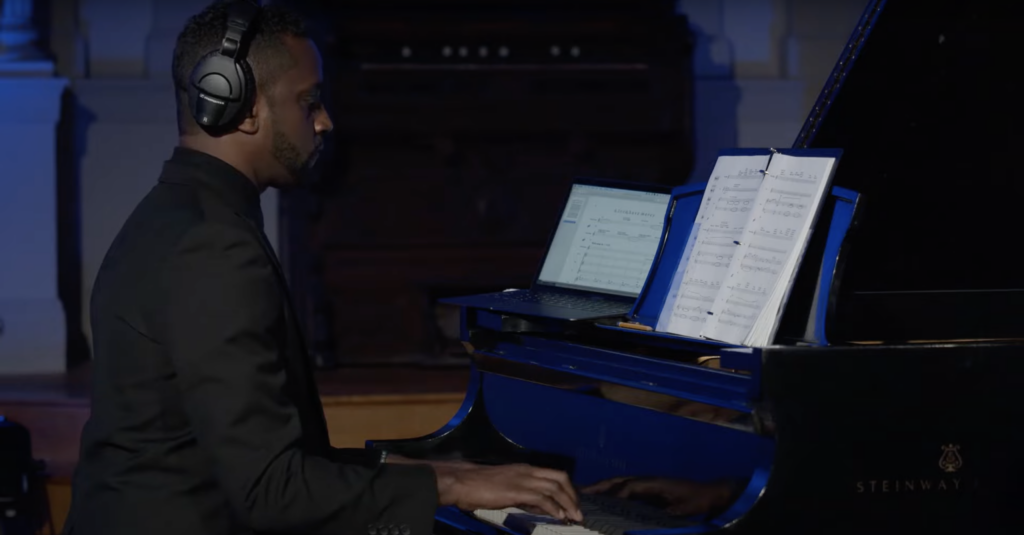A song honoring the 314 enslaved people sold by the Maryland Province of the Society of Jesus made its international debut Nov. 5 at a Library of Congress event.
Written over the past three years, “Requiem for the Enslaved” is an approximately 45-minute multigenre musical work written by Carlos Simon, an assistant professor of music at Georgetown University, that features spoken word. The song honors the 314 enslaved people, commonly referred to as the GU272, sold by the Maryland Province of the Society of Jesus in 1838 to pay off university debts. Simon performed the song, which was funded by the department of performing arts, alongside Hub New Music, a Boston-based classical music group, at the virtual event.
By relaying the story of the GU272 through music, Simon hopes to pay homage to the lives of enslaved people.
“First and foremost, I really want to honor the lives of the women, men and children that were sold, families that were broken up,” Simon said in a phone interview with The Hoya. “The university owes a large debt to these humans.”
The Georgetown community has been reckoning with its history of slavery in recent years. In April 2019, 66.1% of undergraduate students voted in favor of creating a semesterly fee that would go toward a fund to benefit descendants of the GU272. The referendum drew the highest turnout of voters in Georgetown student government history, but despite the result, the university did not implement the proposal, instead launching an initiative in November 2019 to support research and education efforts surrounding GU272.

In March 2021, the university funded the Descendants Truth & Reconciliation Foundation, which was created in collaboration between descendants and Jesuit leaders and was intended to contribute to racial healing programs and scholarships for the descendants of the GU272. The move was met with pushback from student advocacy groups, however.
During the writing process, Simon researched Georgetown’s history, spending time looking through Georgetown’s archives, talking to descendants of the GU272 and visiting cemeteries where many of the enslaved people are buried.
In March 2020, Simon also traveled alongside Bernard Cook, associate dean in Georgetown College, and a group of students to visit the former West Oak Plantation in Maringouin, La., where the Maryland Province of the Society of Jesus sold some of the 314 enslaved people. Simon’s visit informed his writing process, according to Cook.
Cook said Simon’s song helps listeners engage with the university’s relationship to slavery.
“Prof. Simon’s musical composition and performance create opportunities for connection, communion, and implication,” Cook wrote in an email to The Hoya. “We need to share this new musical work with the campus community and with the descendants communities with whom we are seeking to build and maintain relationships. Much of this work involves listening, and Prof. Simon’s ‘Requiem’ can help us to hear differently.”
Simon’s song offers listeners the chance to commemorate the 314 enslaved people in a personal way, according to Adam Rothman, history professor and principal curator of the Georgetown Slavery Archive, an ongoing project that is part of the university’s Slavery, Memory, and Reconciliation initiative.
“I believe the goal of the Requiem is to honor the lives of the GU272 and other enslaved people who built early America,” Rothman wrote in an email to The Hoya. “Professor Simon is drawing from a venerable religious and musical tradition. It’s essentially a prayer for them to rest in peace. But they will not be at peace until we are.”
During the Library of Congress performance, Simon played the piano while Marco Pavé, the first hip-hop artist in residence at Georgetown University, performed the work’s spoken word.
The Library of Congress’ presentation of Simon’s song allowed its message to reach a national audience, according to Rothman.
“It shows that Georgetown’s history has tremendous resonance outside of our own campus, and to have it embraced by our leading national cultural and educational institutions is deeply affirming of the work that many people at Georgetown and beyond have been doing,” Rothman wrote.
According to Simon, the experience of writing the work enriched his understanding of Georgetown’s history of slavery.
“I learned about how Georgetown sold slaves, and that as a Black man really stuck with me. Also, I had a lot of admiration for the university coming forward and saying that we did this, and we are not proud of this, but it is a part of our history,” Simon said.




















